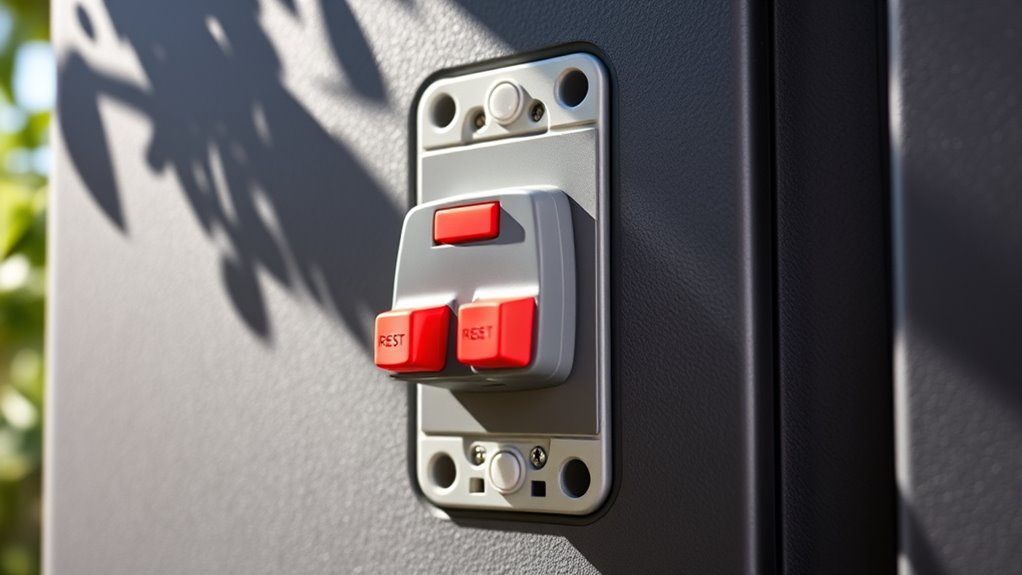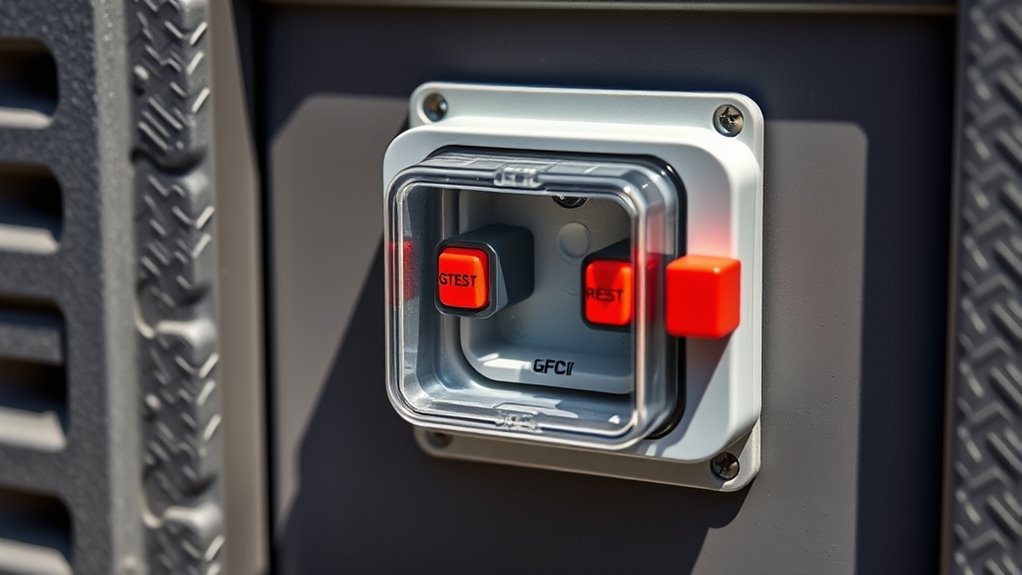A GFCI generator outlet is a safety feature that detects ground faults—when electricity leaks to the ground—and quickly shuts off power to prevent shocks or electrocution. It protects both you and your equipment, especially outdoors or in damp environments. The outlet also offers surge protection, shielding your appliances from voltage spikes. Installing a GFCI outlet guarantees safe, reliable power, so if you want to know more about its benefits and proper setup, keep exploring.
Key Takeaways
- A GFCI generator outlet detects ground faults and quickly shuts off power to prevent electrical shocks and electrocution.
- It provides essential safety during outdoor or damp environments by interrupting power within milliseconds.
- GFCI outlets include surge protection, shielding devices from voltage spikes and power fluctuations.
- Installing a GFCI outlet ensures compliance with safety standards and is recommended for portable power sources.
- They enhance safety, reliability, and lifespan of connected equipment by preventing electrical hazards.

A GFCI generator outlet is a critical safety feature that helps protect you from electrical shocks when using portable power sources. It’s designed to detect ground faults—situations where electricity leaks from the circuit to the ground, which can happen if a wire is damaged or if you accidentally come into contact with a live wire. When a ground fault occurs, the GFCI quickly shuts off power, preventing serious shocks or electrocution. This rapid response is essential, especially when you’re working outdoors or in damp environments, where the risk of electrical shock increases markedly.
A GFCI generator outlet quickly shuts off power to prevent electrical shocks during ground faults.
In addition to protecting against ground faults, a GFCI outlet also provides surge protection. Surges happen when there’s a sudden spike in electrical voltage, often caused by lightning strikes or power fluctuations. Without proper protection, these surges can damage your generator, connected appliances, or sensitive electronic devices. A GFCI outlet often includes built-in surge protection, which helps absorb and redirect excess voltage, preserving the integrity of your equipment and extending its lifespan. This dual function makes GFCI outlets especially valuable for portable power setups, where power stability and safety are essential.
Installing a GFCI generator outlet isn’t complicated, but it’s imperative to make sure it’s done correctly. You should always follow the manufacturer’s instructions or hire a qualified electrician if you’re unsure. Proper installation ensures the GFCI can accurately detect ground faults and provide dependable surge protection. Remember, GFCI outlets are designed to trip within milliseconds of sensing a ground fault, so if your outlet trips frequently, it indicates a potential problem with your wiring or connected devices that needs addressing.
Using a GFCI generator outlet also means you’re complying with electrical safety standards, especially in outdoor or wet conditions. Whether you’re camping, working on a construction site, or powering your home during an outage, a GFCI outlet offers peace of mind. It’s a simple yet effective way to minimize risks associated with electrical faults, which can cause injury or damage your equipment.
Additionally, choosing a vetted GFCI outlet ensures you’re investing in a reliable and high-quality safety device that meets rigorous standards, providing extra confidence in its performance and durability. Ultimately, a GFCI generator outlet is an essential addition to your portable power setup. It safeguards you from ground faults and surges, two common hazards in portable power environments. By preventing electrical shocks and protecting your devices, it guarantees your safety and the longevity of your equipment, making your power use safer, more reliable, and more efficient.
Frequently Asked Questions
Can a GFCI Generator Outlet Be Used Outdoors Safely?
Yes, you can use a GFCI generator outlet outdoors safely if it has weather resistance features. Make certain it’s rated for outdoor use and matches your power compatibility needs. Weather resistance protects against moisture, preventing shorts or electrical shocks. Check the outlet’s specifications to confirm it’s designed for outdoor environments. Properly installing and maintaining it ensures safe operation during outdoor power needs, even in damp or wet conditions.
How Does a GFCI Generator Outlet Differ From Standard Outlets?
A GFCI generator outlet is like a safety net, providing ground fault protection that standard outlets lack. It detects leaks of current, preventing shocks and electrical fires. Unlike regular outlets, which only supply power, a GFCI outlet actively monitors for safety hazards, shutting off power instantly if it senses a ground fault. This makes it essential for protecting you and your equipment, especially in outdoor or damp environments.
Is Installation of a GFCI Generator Outlet Complicated?
Installing a GFCI generator outlet isn’t too complicated, but you should pay close attention to installation concerns and safety considerations. Make sure to turn off the power before starting, follow the manufacturer’s instructions carefully, and use proper tools. If you’re unsure or uncomfortable, it’s best to hire an electrician. Proper installation guarantees safety and compliance with electrical codes, preventing potential hazards and ensuring reliable operation.
What Maintenance Is Required for a GFCI Generator Outlet?
You should perform routine inspections on your GFCI generator outlet to guarantee it’s functioning properly, especially after a ground fault trip. Regularly test the GFCI by pressing the test and reset buttons, and check for any signs of damage or corrosion. Keep the outlet clean and dry, and replace it if it shows signs of wear or malfunctions. This maintenance helps protect you from electrical hazards and keeps your generator safe to use.
Are GFCI Generator Outlets Compatible With All Generator Types?
Like a chameleon adapts to its surroundings, GFCI generator outlets vary in power compatibility and may not fit all generator types. You need to check if the outlet meets your generator’s outlet standards to guarantee proper connection. Some GFCI outlets are designed specifically for certain models, so verify compatibility before installation. This way, you avoid electrical issues and keep your setup safe and functional.
Conclusion
Think of a GFCI generator outlet as your personal shield against electrical surprises. It’s like a vigilant guardian, standing watch to keep you safe from unseen dangers lurking in the dark. By choosing one, you’re not just plugging in a device—you’re anchoring your peace of mind in a fortress of safety. So, don’t wait for a shock to wake you up; invest in a GFCI outlet and keep your electrical world secure and sound.









